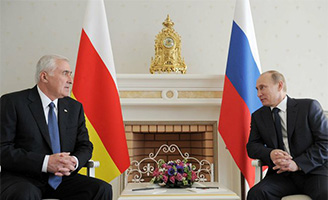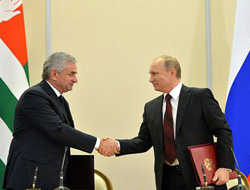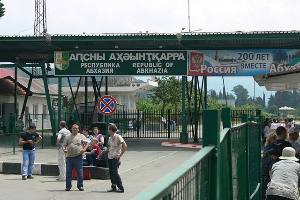CACI Analyst, March 18, 2015
CACI Analyst, March 18, 2015 (.pdf)
Contents
Analytical Articles
TURKMENISTAN POISED FOR TAPI BREAKTHROUGH, by Micha'el Tanchum
NEMTSOV'S ASSASINATION AND THE CHECHEN TRACE, by Emil Souleimanov
RUSSIA TO STRIP ABKHAZIA AND SOUTH OSSETIA OF THEIR LIMITED SOVEREIGNTY, by Valeriy Dzutsev
ARMENIA'S RULING PARTY CONSOLIDATES POWER, by Armen Grigoryan
Field Reports
KYRGYZ CRIME BOSS MURDERED IN MINSK, by Arslan Sabyrbekov
GEORGIA FACES ECONOMIC CRISIS, by Eka Janashia
TAJIKISTAN'S ELECTIONS EXPEL OPPOSITION FROM PARLIAMENT, by Oleg Salimov
ARMENIA TO PARTICIPATE IN BAKU 2015 EUROPEAN GAMES, by Mina Muradova
Russia to Strip Abkhazia and South Ossetia of their Limited Sovereignty
By Valeriy Dzutsev (03/18/2015 issue of the CACI Analyst)
Russia has moved to sign an agreement with South Ossetia, emulating a similar, earlier agreement with Abkhazia. Moscow proposes to eliminate border controls with the two de facto states and essentially annex them in exchange for financial incentives. Despite their inherent weakness, political forces exist in both territories that oppose covert annexation to their large neighbor. Most recently, South Ossetia’s parliament and government clashed over how closely the territory should integrate with Russia. Authorities in Abkhazia and South Ossetia seek to reassure their disgruntled citizens that their countries will retain sovereignty although this aim now appears more illusory than ever.

Russia Presses Ahead with Annexation of Abkhazia and South Ossetia
By Valeriy Dzutsev (11/26/2014 issue of the CACI Analyst)
On November 24, the Russian government signed an agreement with Abkhazia that will further diminish the already limited sovereignty of this territory in exchange for Russian investments and social benefits for the population. The South Ossetian government has signaled that Russia is preparing a similar agreement with this Georgian breakaway territory. Some South Ossetians, however, have unexpectedly spoken out in favor of retaining the republic’s sovereignty. As Russia lays the groundwork for the annexation of Abkhazia and South Ossetia, it encounters surprising opposition from the tiny republics that have become accustomed to a certain degree of independence from Moscow. Tighter control of Abkhazia and South Ossetia will increase the security risks for Georgia.

Russian-Proposed Treaty with Abkhazia Unravels Hopes for Rapprochment with Georgia
By Johanna Popjanevski and Carolin Funke (10/29/2014 issue of the CACI Analyst)
Georgia’s relations with Russia and its breakaway region of Abkhazia have deteriorated in recent months. Moscow-loyal Raul Khajimba’s ascent to power after the August presidential election in Abkhazia, followed by Russia’s proposed treaty on “alliance and integration” with Abkhazia, have given rise to concerns of a Russian annexation of the region and put both Georgia’s reconciliation process with Abkhazia and its attempts to normalize relations with Moscow at stake. In order to avoid a Ukraine-like scenario, Georgia’s Western allies must respond adequately to current developments. The Georgian government and opposition must also overcome their differences and adopt a united front regarding the common goal of restoring Georgia’s territorial integrity.

Moscow and Sukhumi to Sign New Agreement
By Eka Janashia (10/29/2014 issue of the CACI Analyst)
The Russian Federation and the Republic of Abkhazia intend to sign a Kremlin-proposed new agreement “On Alliance and Integration” by the end of October. The draft agreement further limits Abkhazia’s nominal independence in its relationship with Russia by circumscribing its competence to pursue defense and security policies. The publicized provisions of the document triggered reactions apprehensions in Sokhumi as well as Tbilisi.
The draft agreement foresees the introduction of a “common defense infrastructure,” a “combined group of forces” and “joint measures for border protection” to replace existing Abkhazian ones. Abkhazia’s Army, as an autonomous unit, will be replaced with a Combined Group of Forces (CGF) of the Russian and Abkhaz armed forces with joint command and defense infrastructure. In wartime, the commander of CGF will be appointed by Russia’s ministry of defense while citizens of Abkhazia will be able to serve on a contractual basis in Russian military units deployed in the breakaway region. The draft treaty also involves a “collective defense” clause obliging the sides to provide necessary support in case of attack.
The document also envisages a shift of the Russia-Abkhazia de facto border from the Psou River – at the de jure frontier between Russia and Georgia – to the Inguri River, which divides Abkhazia from Georgia proper. Moscow assumes the responsibility to protect the “Abkhaz state border with Georgia” by imposing “joint control” on the movement of people, transport and cargo in Abkhazia’s custom offices including ports.
Meanwhile, the draft treaty posits that Sokhumi will align its customs legislation with Eurasian Economic Union regulations and procedures, and synchronize its budgetary and tax laws with those of Russia in pre-defined time frame. In turn, the Kremlin commits to support Abkhazia’s international recognition, making it eligible for accession into international organizations.
To mitigate its obvious attempt to annex the region, Moscow pledges to increase the salaries of employees at state agencies and pensions for Russian citizens residing in Abkhazia. Notably, possessing Russian passports, the majority of Abkhazia’s residents are Russian citizens. Moscow promises to integrate these people into Russia’s federal compulsory health insurance system, which will allow them access to Russian healthcare services.
Despite extensive social assurances, the draft agreement triggered concerns in Abkhazia’s political and civil society circles. Even incumbent officials of the de facto republic stated a need to revise the document, which will otherwise lead to the loss of Abkhazia’s sovereignty. The fragility of opposition forces in Abkhazia, however, makes considerable changes to the draft unlikely.
Tbilisi termed the document a “step towards annexation” of Abkhazia by the Kremlin. Georgia’s PM Irakli Gharibashvili said that “this [treaty] is directly contrary to their [Abkhazians] 25-year struggle for self-determination, recognition and so-called independence.” Gharibashvili’s statement was strongly criticized by most Georgian opposition politicians and analysts. The ethnic cleansing and expulsion of Georgians from their homes deprives Abkhazia of a right to “self-determination” and the use of this term by Georgia’s PM could legitimize Abkhazia’s struggle for independence, the opponents asserted.
Meanwhile, Georgia’s parliament did not support the opposition United National Movement (UNM) party’s demand to abolish the Karasin-Abashidze format. Bilateral talks between the Georgian PM’s special envoy for relations with Russia, Zurab Abashidze, and Russia’s deputy foreign minister Grigory Karasin have taken place since December 2012 and mainly focuses on economic and trade issues. Tbilisi should express its protest to Moscow by repealing the format, UNM claimed.
Moscow termed Tbilisi’s reaction to the proposed treaty an “unscrupulous and dangerous speculation,” which may thwart the Geneva discussions, launched after the Russia-Georgia August war. For Tbilisi, maintaining the international platform provided by the Geneva talks is vitally important, as the format recognizes Russia as a party to the conflict. The Geneva talks also allow Georgia to discuss conflict related issues at the international level with the engagement of the EU, OSCE, and the UN, as well as the U.S. For the same reasons, Moscow is interested in thwarting the Geneva talks and instead reinforce direct, bilateral ties with Tbilisi.
The draft agreement proposed by the Kremlin will diminish any illusions that may have existed in Abkhazia regarding the region’s ability to attain sovereignty. The move will also test both Tbilisi’s capability to consolidate international pressure against Russia and Sokhumi’s strength to resist Moscow.








 Book S. Frederick Starr and Svante E. Cornell,
Book S. Frederick Starr and Svante E. Cornell,